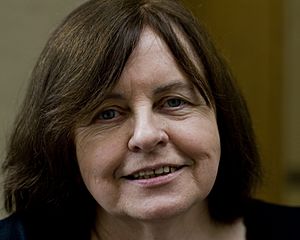Bernadette Devlin McAliskey facts for kids
Quick facts for kids
Bernadette Devlin McAliskey
|
|
|---|---|

McAliskey in 2011
|
|
| Member of Parliament for Mid Ulster |
|
| In office 17 April 1969 – 8 February 1974 |
|
| Preceded by | George Forrest |
| Succeeded by | John Dunlop |
| Personal details | |
| Born |
Josephine Bernadette Devlin
23 April 1947 Cookstown, County Tyrone, Northern Ireland |
| Nationality | Irish |
| Political party | Independent Republican (1970–1974), (1976–1977), (1978–present) |
| Other political affiliations |
Unity (1969–1970), Irish Republican Socialist Party (1974–1976), Independent Socialist Party (1977–1978) |
| Spouse | Michael McAliskey |
| Children | Róisín McAliskey |
| Alma mater | Queen's University Belfast |
Josephine Bernadette McAliskey (born 23 April 1947), often known as Bernadette Devlin, is a famous civil rights leader and former politician from Northern Ireland. She is known for her powerful speeches and for fighting for the rights of people in her community.
In 1969, she was elected to the British Parliament as the Member of Parliament (MP) for Mid Ulster. At just 21 years old, she was the youngest woman ever elected to Parliament at that time. She broke with the tradition of many Irish politicians by taking her seat in London to represent her people directly.
Her time as an MP was during a period known as the Troubles, a long and difficult conflict in Northern Ireland. Throughout her life, she has worked towards the goal of a united, socialist Ireland. She was a key figure in the civil rights movement and later helped create new political groups.
In 1981, she and her husband survived a serious attack at their home. Despite this, she continued her work. Since 1997, she has led the South Tyrone Empowerment Programme, an organization that helps local communities and migrant workers.
Contents
Early Life and Education
Bernadette Devlin was born in Cookstown, County Tyrone, into a Catholic family. She was one of six children. Her father, John James, taught her about Irish Republican ideas. He passed away when she was nine, and her family faced hard times. Her mother, Elizabeth, died when Bernadette was nineteen, leaving her to help care for her younger siblings while attending university.
She went to St Patrick's Girls Academy in Dungannon. In 1968, she was studying psychology at Queen's University Belfast. There, she became a leader in a student civil rights group called People's Democracy.
Becoming a Politician
Winning a Seat in Parliament
After the Member of Parliament for Mid Ulster passed away, a special election was held in 1969. Bernadette ran for the seat and won, defeating the wife of the previous MP. At age 21, she became the youngest MP in the British Parliament.
She promised her voters, "I will take my seat and fight for your rights." This was different from other Irish politicians who often refused to take their seats in London. On 22 April 1969, the day before her 22nd birthday, she gave her first speech in Parliament just an hour after being sworn in.
The Battle of the Bogside
In August 1969, Bernadette took part in the Battle of the Bogside, a major protest in the city of Derry. She stood with the residents who were defending their neighborhood. Because of her role in the protest, she was later sentenced to six months in prison. Even so, she was re-elected to Parliament in 1970.
A Voice for Civil Rights
Touring the United States
Soon after the Battle of the Bogside, Bernadette toured the United States. She met with members of the Black Panther Party and supported their fight for civil rights. She compared the struggles of African-Americans to those of Catholics in Northern Ireland.
In New York, the mayor offered her a key to the city. Believing that the honor should go to Americans fighting for their own rights, she sent a friend to give the key to the Black Panther Party in Harlem.
The Events of Bloody Sunday
In 1972, Bernadette witnessed the tragic events of Bloody Sunday in Derry, where British soldiers shot at unarmed protesters. The next day in Parliament, she was angry that she was not allowed to speak about what she had seen.
When the Home Secretary, Reginald Maudling, claimed the soldiers had fired in self-defense, Bernadette walked across the room and slapped his face. She later said, "I'm just sorry I didn't get him by the throat." This moment showed her deep anger over the injustice of the event.
Later Career and Activism
Supporting Prisoners' Rights
In the late 1970s and early 1980s, McAliskey supported Irish prisoners who were protesting for better conditions. She was a leading voice in the campaign that supported the hunger strikes.
Attack and Survival
On 16 January 1981, members of an armed group called the Ulster Defence Association broke into her home and attacked her and her husband. Bernadette was seriously injured in front of her children. British soldiers who were nearby arrived and took the couple to a hospital by helicopter. The attackers were caught and sent to prison.
South Tyrone Empowerment Programme
Today, McAliskey is the head of the South Tyrone Empowerment Programme (STEP), which she helped start in 1997. The organization is based in Dungannon and works on community development. It also provides support and advice for migrant workers in Northern Ireland.
Personal Life
In 1971, Bernadette had a daughter, Róisín. In 1973, she married Róisín's father, Michael McAliskey. She is a fluent speaker of the Irish language.
Images for kids
See also
 In Spanish: Bernadette Devlin para niños
In Spanish: Bernadette Devlin para niños



